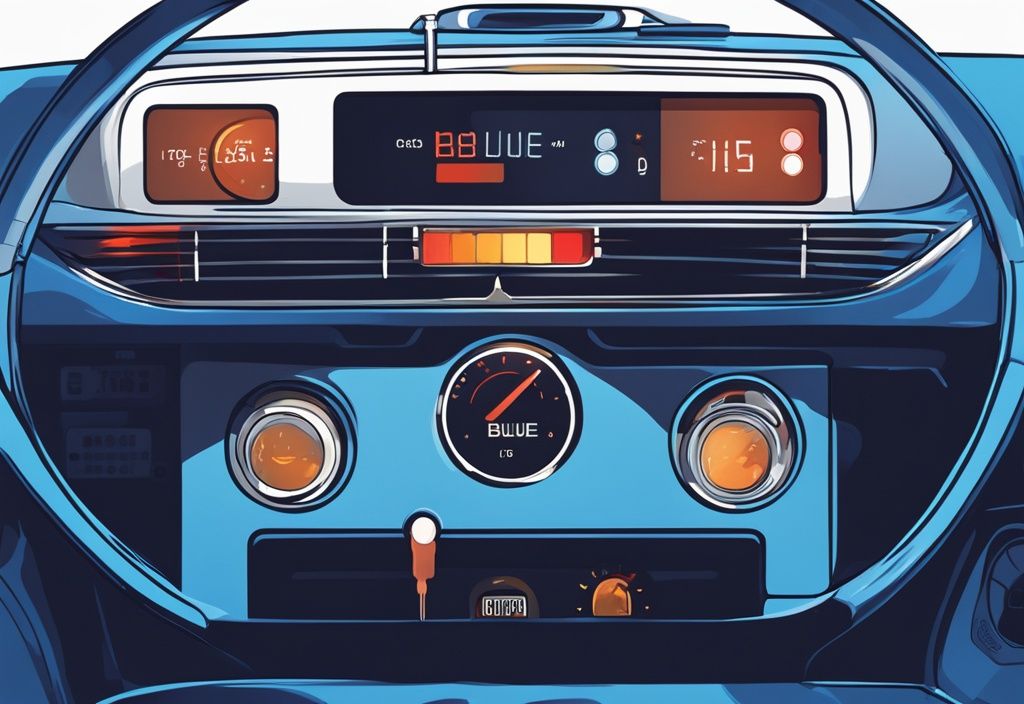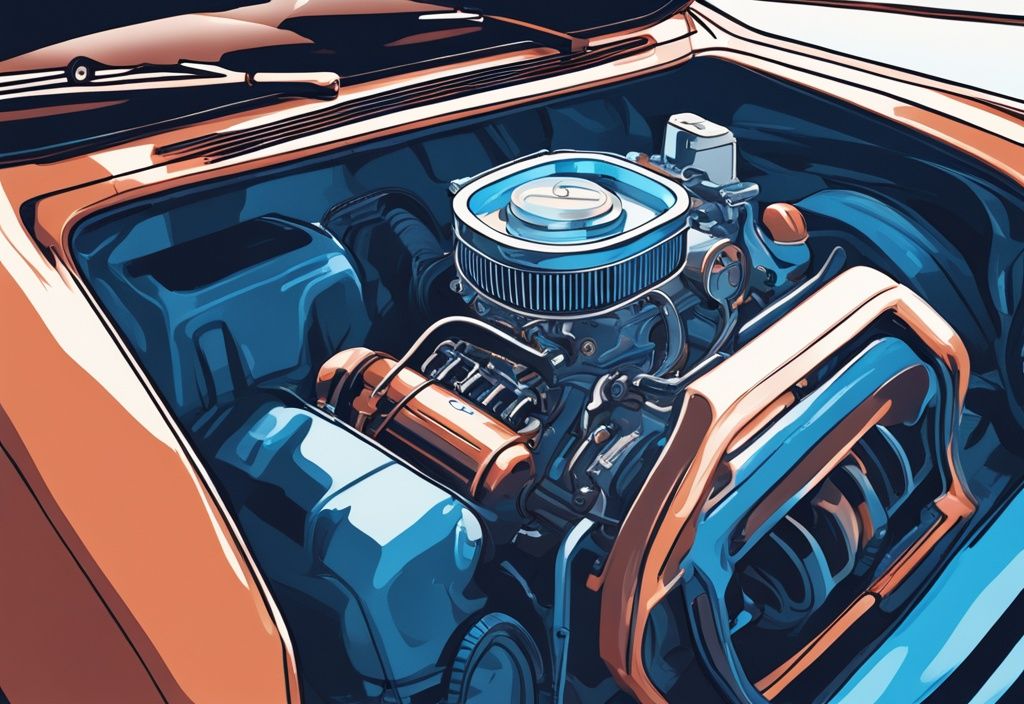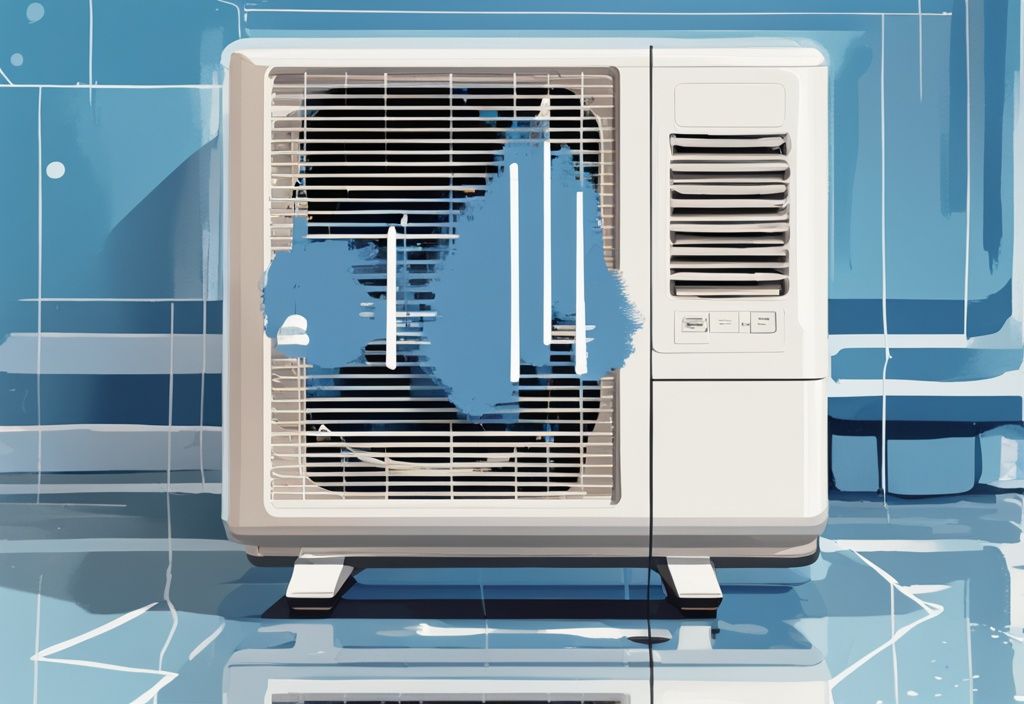High Engine Temp Causes: How AC Off Can Prevent Overheating
Ever had your peaceful drive interrupted by a sudden “AC off due to high engine temp” warning? I’m John Parker, a seasoned HVAC technician, and I’m here to put your worries to rest. This alarming yet common issue can signal your vehicle’s engine overheating, potentially putting critical components at risk.
Understanding the root of this problem is crucial for any car owner, especially during hot weather when the risk of overheating increases significantly. For more insights on what to do if your car overheats, check out this helpful guide from Consumer Reports. In this breakdown, we will delve into the reasons behind this warning, highlighting common causes and symptoms that you should be aware of.
Stick with me and we’ll explore practical and easy-to-implement solutions to get your AC and engine back to their prime. Your vehicle deserves to stay cool, and so do you.
Understanding the “AC Off Due to High Engine Temp” Warning
What Does the Warning Mean?
- Seeing the “AC off due to the engine temperature too high” warning? It means your vehicle’s engine is getting too hot. This alert is like a red flag indicating the engine’s cooling system isn’t doing its job right, so it needs quick attention.
- In simpler terms, this message is flashing because there’s a hitch in the engine’s cooling process. The engine temperature has climbed so high that the AC system has to shut down to prevent putting extra load on the engine.
Why Does the AC Automatically Switch Off?
- Your car’s AC system knows when to step in. It automatically turns off when the engine temperature spikes too high. This is a smart move to cut down the engine load and avoid severe overheating or engine damage.
- The Engine Control Unit (ECU) is the brains behind this. It keeps tabs on the engine temperature, and when things heat up beyond safe levels, it orders the AC off. This helps reduce heat and let the engine cool down more effectively.
Car System Design and AC Shutdown
- Modern cars come with some nifty systems designed to shield the engine. One cool feature is the AC’s automatic shutdown at high engine temps. It saves energy and cuts back on heat production.
- A car’s computer constantly monitors how things are running and the environment. When it senses a risk of overheating, it acts fast to protect engine parts by regulating features like the AC, boosting overall car safety and performance.
Common Causes of High Engine Temperature
Experiencing elevated engine temperatures can be a hassle, especially when it causes your AC to shut off. Below, I’ll break down the common reasons why this might be happening and how you can go about diagnosing and fixing these issues.
Malfunctioning Coolant Temperature Sensor
- The coolant temperature sensor plays a crucial role in regulating the engine’s cooling system. When it malfunctions, it can give false readings, leading to unintentional overheating and triggering the “ac off due to high engine temp” warning.
- Diagnosis typically involves testing the sensor and checking resistance values at the ECM/PCM to pinpoint any discrepancies.
Thermostat Issues
- A thermostat stuck in either an open or closed position can disrupt the engine’s temperature regulation, causing overheating. This condition often results in the automatic shutdown of the AC unit to prevent further temperature rise.
- Replacing the thermostat and its housing can often resolve these issues and is considered a vital preventative measure.
Low Engine Coolant Levels
- Insufficient coolant levels, often due to leaks or poor maintenance, can cause engine temperatures to spike, leading to the AC being turned off by the ECU to protect the engine.
- Regularly checking the coolant reservoir and ensuring it is filled to the appropriate level can prevent these overheating incidents.
Faulty Intake Air Temperature Sensor
- The intake air temperature sensor affects how the engine’s computer manages air-fuel ratios and temperature readings. A faulty sensor can produce erroneous data, leading to mismanagement of the engine’s thermal state and the “ac off due to high engine temp” alert.
AC Compressor Failure
- The AC compressor is essential in maintaining the engine’s temperature by effectively dissipating heat. Failure in the compressor can lead directly to elevated engine temperatures, prompting an automatic shutdown of the AC system to mitigate strain on the engine.
Blown Head Gasket
- A blown head gasket is a severe issue that causes engine coolant to leak into the combustion chamber, resulting in a significant rise in engine temperature. This condition can easily trigger the “ac off due to high engine temp” warning and demands immediate attention.

Other Potential Causes (Water Pump, Engine Oil, Weather)
- A malfunctioning water pump can hinder coolant circulation, leading to overheating. Similarly, low engine oil levels can increase engine friction and heat, and extremely hot weather adds additional thermal load, all potentially triggering the AC shutdown. Ensuring all these components are in good working order can prevent overheating and maintain optimal engine temperature.
Symptoms and Diagnostic Indicators
Recognizing the signs when your AC shuts off due to high engine temperature can help you address the problem early and avoid serious engine damage. Here are some key symptoms to watch for and what they might indicate.
When the AC Shuts Off
- When your vehicle’s AC turns off without warning, it’s often a sign of engine overheating. This is a protective measure, preventing further heat accumulation that could damage the engine.
Temperature Gauge Stays on “C”
- If the temperature gauge is stuck on “C”, it might be because the engine’s cooling system isn’t warming up properly. This can result from a faulty coolant temperature sensor or unusually low coolant levels.
Engine Cooling Fans Running at Full Speed
- Notice those cooling fans running at full throttle or staying on after you’ve turned off your vehicle? That’s a clear indicator of engine overheating. Although these fans are doing their best to cool things down, constant operation points to an unresolved issue under the hood.
Dash Gauge Reading Cold
- Another indicator of trouble is if the dashboard gauge shows a cold temperature while the engine is working overtime. Combine this with the AC shutting off, high-speed fans, and lukewarm hoses, and you’ve got signs of an engine temperature regulation problem.
Diagnostic Trouble Code: P0128
- Seeing Error Code P0128? That usually means the engine coolant temperature is lower than it should be according to the thermostat. Not only can this hurt your fuel economy and increase emissions, but it also flags up a problem needing urgent attention to prevent major repair costs.
Troubleshooting and Diagnostic Steps
Experiencing the “AC off due to high engine temp” warning can be frustrating, but with the right approach, you can troubleshoot and fix the issue. Let’s walk through some diagnostic steps to get your AC back in working order.
Using a Scanner to Check Water Temperature
- Start by connecting an OBD-II scanner to your vehicle to read the water temperature. If the temperature reads 149 degrees Fahrenheit, this is below normal operating levels. This could indicate that something is amiss with your engine’s cooling system.
Testing the Coolant Temperature Sensor
- Testing the Coolant Temperature Sensor is crucial. You’ll need to check the resistance values at the ECM/PCM. Accurate data from this sensor ensures that your vehicle’s control unit can manage cooling effectively.
- Measure the resistance across the sensor’s pins and compare these values to a resistance-temperature chart. This step will help confirm if the sensor is working properly.
Checking Wiring and Connections
- Next, inspect all wiring and connections related to the ECT sensor. Look for any damaged wires and verify that all connections are secure. Loose or faulty wiring can lead to incorrect temperature readings and might be the cause of your “AC off due to high engine temp” warning.
Inspecting the Thermostat and Housing
- Perform a detailed inspection of the thermostat and its housing. A faulty thermostat can prevent your engine from regulating temperature correctly, leading to overheating. If you find any signs of wear or malfunction, replace the thermostat and housing.
Verifying Ground Connections
- Check all ground connections related to the coolant temperature sensor and other components. Ensure these connections are clean, secure, and free from corrosion. Bad ground connections can cause electrical problems that might trigger false temperature readings.
Resetting the System
- Sometimes the simplest solutions are the most effective. Try resetting the system by disconnecting the car battery for a few minutes. This action can reset the Engine Control Unit (ECU) and clear any faults causing the temperature warning and AC shutdown.

Steps to Take When the Warning Light Comes On
When that dreaded “AC off due to high engine temp” warning light pops up, it’s a clear sign that your engine is overheating. Addressing this issue promptly can save you a ton of heartache and hefty repair bills. Here’s a step-by-step guide to help you navigate through this situation safely and effectively.
Immediate Actions to Perform
- If the “AC off due to high engine temp” warning light turns on, pull over immediately to check the engine’s condition. Continuing to drive can severely damage your engine.
- Head to a professional garage promptly for a thorough cooling system inspection and necessary repairs.
Find a Safe Place to Stop
- Ensure your safety by finding a secure spot to pull over. Activate your emergency lights to alert other drivers of your stationary vehicle.
Turn on Emergency Lights
- Turn on your vehicle’s emergency hazard lights to remain visible to other motorists, reducing the risk of accidents while you address the issue.
Allowing the Engine to Cool Down
- Allow the engine to cool for about 10-15 minutes before opening the hood. This cooling period helps prevent burns and ensures a safer check on the coolant levels.
Checking the Coolant Reservoir
Once your engine has had time to cool down, it’s crucial to check the coolant reservoir. Low coolant levels can be a primary cause of overheating, so this step can’t be skipped.
- Carefully inspect the coolant reservoir. Check if the coolant levels are adequate because low levels can contribute to overheating issues.
Safely Opening the Coolant Cap
- When opening the coolant reservoir cap, use a cloth or gloves for added protection. This precaution helps you avoid burns from any hot steam or boiling coolant.
Preventive Measures and Regular Maintenance
Keeping your car’s air conditioning system in top-notch condition isn’t just about staying cool—it also helps avoid engine issues that can lead to the dreaded “AC off due to high engine temp” warning. Let’s dive into some practical tips to keep everything running smoothly.
Running the AC Weekly
- Make it a habit to run your AC system for around 10 minutes once a week. This simple routine helps maintain the right pressure within the system and keeps the compressor in good working order. Regular use keeps the system lubricated and prevents seals from drying out, ensuring longevity and efficient performance.
Recharging the AC System
- Ensure your AC system operates efficiently by recharging it every two years. Recharging involves refilling the refrigerant and checking for leaks or issues. Periodic recharging maintains optimal cooling performance and prevents engine strain, thus reducing the chances of triggering the “AC off due to high engine temp” warning.
Regular Oil Changes
- Stick to regular oil changes based on your vehicle manufacturer’s guidelines, usually every 3,000 to 5,000 miles. Fresh oil improves engine performance, reduces the risk of overheating, and limits wear and tear on critical components. This practice helps prevent conditions that could force your car’s AC to switch off due to high engine temperature.
Checking and Maintaining Belts and Pipes
- Regularly inspect and maintain belts and hoses. Keep an eye out for signs of wear like cracks, fraying, or leaks, and replace them as needed. Properly maintained belts and hoses contribute to the efficient functioning of both the engine and the AC system, lowering the chances of overheating.
Periodic Coolant and Oil Level Checks
- Frequently check coolant levels and engine oil. Ensuring these fluids are at optimal levels is crucial for engine health and prevents overheating. Regular checks can spot leaks or other issues early, staving off any severe problems that could lead to the “AC off due to high engine temp” warning.
Monitoring Engine Temperature Indicators
- Keep a close eye on engine temperature indicators, especially during hot weather or heavy AC use. Any anomalies in temperature readings can signal potential issues. Addressing these issues promptly can prevent the engine from overheating and ensure the AC system functions reliably.
Potential Damage from Ignoring High Engine Temp
Understanding the impact of ignoring the “AC off due to high engine temp” warning is crucial. Let’s explore the potential consequences that could arise from not addressing this important issue.
Strain on the Engine
-
Ignoring the warning light that says “AC off due to high engine temp” really puts your engine through the wringer. Engines are like us; they have an ideal temperature range where they perform best. Push them beyond that, and you’re looking at some serious trouble. If you’re dealing with engine issues, understanding how to resolve specific errors like the GE AC error code 88 fix can be incredibly helpful.

- Picture this: you’re out for a jog on a scorching summer day without any water. Not fun, right? That’s what your engine goes through under excessive stress. The internal components, designed for cooler conditions, start to suffer wear and tear, reducing efficiency and lifespan. For a comprehensive assessment of reliable HVAC systems, check out our RUUD HVAC review to ensure your home stays comfortable and your systems remain efficient.
- Continued strain can lead to nasty surprises. You could end up with warped cylinder heads, melted pistons, and gaskets damaged beyond repair. Trust me, these issues aren’t cheap or easy to fix.
Risk of Overheating
- The risk of overheating tied to the “AC off due to high engine temp” warning is no small matter. As the temperature climbs, the engine struggles to keep everything together, much like a cake left too long in the oven. Learn what to do when your GMC Acadia AC light flashes 6 times.
- Prolonged overheating can have catastrophic effects. We’re talking about complete engine failure, leaving you not just stranded, but also facing a hefty repair bill. And let’s not forget, it’s a major safety hazard. A sudden engine shutdown while you’re on the road can lead to accidents or breakdowns in the middle of nowhere.
- Addressing this warning as soon as it pops up isn’t just important—it’s imperative. Doing so can save you from these hazardous and costly situations.
Understanding the Warning and How to Respond
- If the “AC off due to high engine temp” warning has ever popped up on your dashboard, you know it can be a bit alarming. What this means is your engine is getting too hot, and the ECU (that’s your vehicle’s brain) has decided to turn off the AC. This is a protective measure to prevent further heat buildup. Now, I’ve seen this plenty of times in my career, and let me tell you, it’s crucial not to ignore it. Keeping your engine cool is essential for its health and performance. A quick check and prompt action can save you from serious engine damage and keep your ride smooth.
- Now, let’s talk about prevention. Regular maintenance is your best friend here. Make it a habit to routinely check your coolant levels—think of it like giving your car a refreshing drink. Also, inspect those sensors and make sure everything is working as it should. I’ve found that most issues can be nipped in the bud with some vigilant monitoring. And remember, the sooner you address that warning, the better. This little effort can prevent unexpected breakdowns and save you from shelling out on costly repairs. Keep your vehicle in top shape, and it’ll take care of you.
FAQ
Ever faced that dreaded “AC off due to high engine temp” warning while driving? Let’s break down what it means and how to handle it, step by step.
What does “AC off due to high engine temp” mean?
- This warning indicates that your engine’s temperature is dangerously high. To prevent further overheating and potential damage, the AC system shuts down automatically.
What should I do if my car displays this warning?
- First things first, find a safe spot to pull over and turn on your emergency lights. Give the engine several minutes to cool down and then check your coolant levels. If you’re unsure or the problem persists, don’t hesitate to call a professional for help.
Can I still drive my car if the AC shuts off due to high engine temperature?
- Absolutely not. Continuing to drive with an overheating engine can cause severe damage. It’s crucial to stop driving and address the overheating issue immediately.
How often should I check my coolant levels?
- Keeping an eye on your coolant levels is a good habit to adopt. Make it a routine check, especially before long journeys and during regular vehicle maintenance. This way, you can avoid those annoying “AC off due to high engine temp” situations.
What are the costs involved in repairing a faulty coolant temperature sensor?
- Repairing a faulty coolant temperature sensor usually isn’t too expensive, but remember that labor costs can vary. It all depends on your vehicle model and how complex the repair job is.




Post Comment